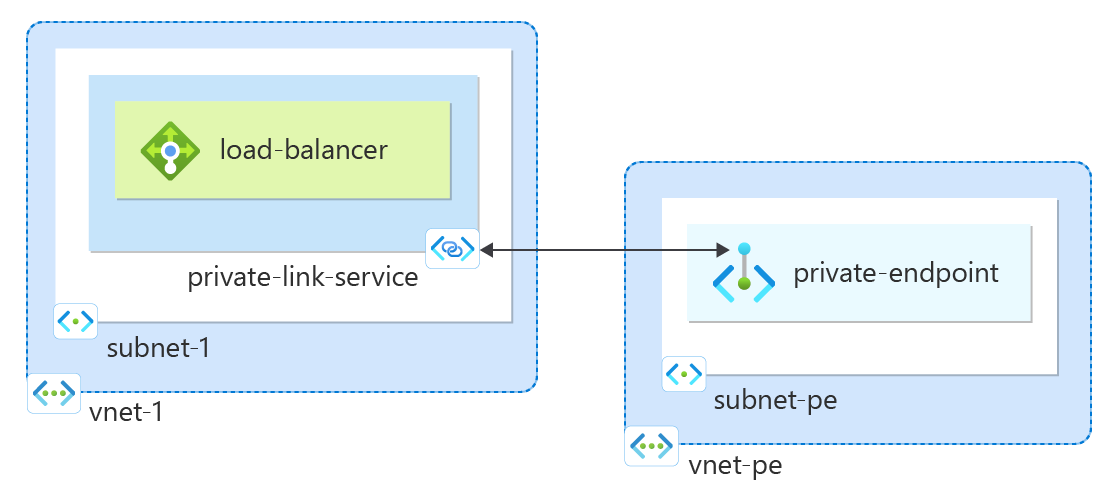快速入門:使用 Azure PowerShell 建立 Private Link 服務
開始建立參考您服務的 Private Link 服務。 針對在 Azure Standard Load Balancer 後方部署的服務或資源,授與 Private Link 存取權限。 您服務的使用者可以從其虛擬網路進行私人存取。
必要條件
具有有效訂用帳戶的 Azure 帳戶。 免費建立帳戶。
Azure Cloud Shell 或 Azure PowerShell
本快速入門中的步驟會在 Azure Cloud Shell 中以互動方式執行 Azure PowerShell Cmdlet。 若要在 Cloud Shell 中執行命令,請選取程式碼區塊右上角的 [開啟 Cloudshell]。 選取 [複製] 以複製程式碼,然後將其貼入 Cloud Shell 以執行。 您也可以從 Azure 入口網站內執行 Cloud Shell。
您也可以在本機安裝 Azure PowerShell 來執行 Cmdlet。 本文中的步驟需要 Azure PowerShell 模組 5.4.1 版或更新版本。 執行
Get-Module -ListAvailable Az來了解您安裝的版本。 如果您需要升級,請參閱更新 Azure PowerShell 模組。如果您在本機執行 PowerShell,請執行
Connect-AzAccount以連線至 Azure。
建立資源群組
Azure 資源群組是在其中部署與管理 Azure 資源的邏輯容器。
使用 New-AzResourceGroup 建立資源群組:
New-AzResourceGroup -Name 'test-rg' -Location 'eastus2'
建立內部負載平衡器
在本節中,您會建立虛擬網路和內部 Azure Load Balancer。
虛擬網路
在本節中,您會建立虛擬網路和子網路,以裝載可存取 Private Link 服務的負載平衡器。
- 使用 New-AzVirtualNetwork 建立虛擬網路。
## Create backend subnet config ##
$subnet = @{
Name = 'subnet-1'
AddressPrefix = '10.0.0.0/24'
}
$subnetConfig = New-AzVirtualNetworkSubnetConfig @subnet
## Create the virtual network ##
$net = @{
Name = 'vnet-1'
ResourceGroupName = 'test-rg'
Location = 'eastus2'
AddressPrefix = '10.0.0.0/16'
Subnet = $subnetConfig
}
$vnet = New-AzVirtualNetwork @net
建立標準負載平衡器
本節將詳細說明如何建立及設定下列負載平衡器元件:
使用 New-AzLoadBalancerFrontendIpConfig 建立前端 IP 集區的前端 IP。 此 IP 會接收負載平衡器上的連入流量
使用 New-AzLoadBalancerBackendAddressPoolConfig,為從負載平衡器的前端傳送的流量建立後端位址集區。 此集區是您的後端虛擬機器部署所在的位置。
使用 Add-AzLoadBalancerProbeConfig 建立健全狀態探查,以判斷後端 VM 執行個體的健全狀態。
使用 Add-AzLoadBalancerRuleConfig 建立負載平衡器規則,以定義如何將流量分散至 VM。
使用 New-AzLoadBalancer 建立公用負載平衡器。
## Place virtual network created in previous step into a variable. ##
$vnet = Get-AzVirtualNetwork -Name 'vnet-1' -ResourceGroupName 'test-rg'
## Create load balancer frontend configuration and place in variable. ##
$lbip = @{
Name = 'frontend'
PrivateIpAddress = '10.0.0.4'
SubnetId = $vnet.subnets[0].Id
}
$feip = New-AzLoadBalancerFrontendIpConfig @lbip
## Create backend address pool configuration and place in variable. ##
$bepool = New-AzLoadBalancerBackendAddressPoolConfig -Name 'backend-pool'
## Create the health probe and place in variable. ##
$probe = @{
Name = 'health-probe'
Protocol = 'http'
Port = '80'
IntervalInSeconds = '360'
ProbeCount = '5'
RequestPath = '/'
}
$healthprobe = New-AzLoadBalancerProbeConfig @probe
## Create the load balancer rule and place in variable. ##
$lbrule = @{
Name = 'http-rule'
Protocol = 'tcp'
FrontendPort = '80'
BackendPort = '80'
IdleTimeoutInMinutes = '15'
FrontendIpConfiguration = $feip
BackendAddressPool = $bePool
}
$rule = New-AzLoadBalancerRuleConfig @lbrule -EnableTcpReset
## Create the load balancer resource. ##
$loadbalancer = @{
ResourceGroupName = 'test-rg'
Name = 'load-balancer'
Location = 'eastus2'
Sku = 'Standard'
FrontendIpConfiguration = $feip
BackendAddressPool = $bePool
LoadBalancingRule = $rule
Probe = $healthprobe
}
New-AzLoadBalancer @loadbalancer
停用網路原則
在虛擬網路中建立私人連結服務之前,必須先停用設定 privateLinkServiceNetworkPolicies。
- 使用 Set-AzVirtualNetwork 停用網路原則。
## Place the subnet name into a variable. ##
$subnet = 'subnet-1'
## Place the virtual network configuration into a variable. ##
$net = @{
Name = 'vnet-1'
ResourceGroupName = 'test-rg'
}
$vnet = Get-AzVirtualNetwork @net
## Set the policy as disabled on the virtual network. ##
($vnet | Select -ExpandProperty subnets | Where-Object {$_.Name -eq $subnet}).privateLinkServiceNetworkPolicies = "Disabled"
## Save the configuration changes to the virtual network. ##
$vnet | Set-AzVirtualNetwork
建立私人連結服務
在本節中,建立使用上一個步驟中所建立 Standard Azure Load Balancer 的私人連結服務。
使用 New-AzPrivateLinkServiceIpConfig 建立私人連結服務 IP 組態。
使用 New-AzPrivateLinkService 建立建立私人連結服務。
## Place the virtual network into a variable. ##
$vnet = Get-AzVirtualNetwork -Name 'vnet-1' -ResourceGroupName 'test-rg'
## Create the IP configuration for the private link service. ##
$ipsettings = @{
Name = 'ipconfig-1'
PrivateIpAddress = '10.0.0.5'
Subnet = $vnet.subnets[0]
}
$ipconfig = New-AzPrivateLinkServiceIpConfig @ipsettings
## Place the load balancer frontend configuration into a variable. ##
$par = @{
Name = 'load-balancer'
ResourceGroupName = 'test-rg'
}
$fe = Get-AzLoadBalancer @par | Get-AzLoadBalancerFrontendIpConfig
## Create the private link service for the load balancer. ##
$privlinksettings = @{
Name = 'private-link-service'
ResourceGroupName = 'test-rg'
Location = 'eastus2'
LoadBalancerFrontendIpConfiguration = $fe
IpConfiguration = $ipconfig
}
New-AzPrivateLinkService @privlinksettings
您的私人連結服務已建立,且可以接收流量。 如果您想要查看流量,請在標準負載平衡器後方設定您的應用程式。
建立私人端點
在本節中,您會將私人連結服務對應至私人端點。 虛擬網路包含私人連結服務的私人端點。 此虛擬網路包含將存取私人連結服務的資源。
建立私人端點虛擬網路
- 使用 New-AzVirtualNetwork 建立虛擬網路。
## Create backend subnet config ##
$subnet = @{
Name = 'subnet-pe'
AddressPrefix = '10.1.0.0/24'
}
$subnetConfig = New-AzVirtualNetworkSubnetConfig @subnet
## Create the virtual network ##
$net = @{
Name = 'vnet-pe'
ResourceGroupName = 'test-rg'
Location = 'eastus2'
AddressPrefix = '10.1.0.0/16'
Subnet = $subnetConfig
}
$vnetpe = New-AzVirtualNetwork @net
建立端點和連線
使用 Get-AzPrivateLinkService,將您稍早建立的私人連結服務組態放到變數中,以供稍後使用。
使用 New-AzPrivateLinkServiceConnection 來建立連線組態。
使用 New-AzPrivateEndpoint 來建立端點。
## Place the private link service configuration into variable. ##
$par1 = @{
Name = 'private-link-service'
ResourceGroupName = 'test-rg'
}
$pls = Get-AzPrivateLinkService @par1
## Create the private link configuration and place in variable. ##
$par2 = @{
Name = 'connection-1'
PrivateLinkServiceId = $pls.Id
}
$plsConnection = New-AzPrivateLinkServiceConnection @par2
## Place the virtual network into a variable. ##
$par3 = @{
Name = 'vnet-pe'
ResourceGroupName = 'test-rg'
}
$vnetpe = Get-AzVirtualNetwork @par3
## Create private endpoint ##
$par4 = @{
Name = 'private-endpoint'
ResourceGroupName = 'test-rg'
Location = 'eastus2'
Subnet = $vnetpe.subnets[0]
PrivateLinkServiceConnection = $plsConnection
}
New-AzPrivateEndpoint @par4 -ByManualRequest
核准私人端點連線
在本節中,您會核准您在先前步驟中建立的連線。
- 使用 Approve-AzPrivateEndpointConnection 來核准連線。
## Place the private link service configuration into variable. ##
$par1 = @{
Name = 'private-link-service'
ResourceGroupName = 'test-rg'
}
$pls = Get-AzPrivateLinkService @par1
$par2 = @{
Name = $pls.PrivateEndpointConnections[0].Name
ServiceName = 'private-link-service'
ResourceGroupName = 'test-rg'
Description = 'Approved'
PrivateLinkResourceType = 'Microsoft.Network/privateLinkServices'
}
Approve-AzPrivateEndpointConnection @par2
私人端點的 IP 位址
在本節中,您將尋找與負載平衡器和私人連結服務對應的私人端點 IP 位址。
- 使用 Get-AzPrivateEndpoint 來擷取 IP 位址。
## Get private endpoint and the IP address and place in a variable for display. ##
$par1 = @{
Name = 'private-endpoint'
ResourceGroupName = 'test-rg'
ExpandResource = 'networkinterfaces'
}
$pe = Get-AzPrivateEndpoint @par1
## Display the IP address by expanding the variable. ##
$pe.NetworkInterfaces[0].IpConfigurations[0].PrivateIpAddress
❯ $pe.NetworkInterfaces[0].IpConfigurations[0].PrivateIpAddress
10.1.0.4
清除資源
當不再需要時,您可以使用 Remove-AzResourceGroup 命令來移除資源群組、負載平衡器和其餘資源。
Remove-AzResourceGroup -Name 'test-rg'
下一步
在本快速入門中,您將:
建立虛擬網路和內部 Azure Load Balancer。
建立私人連結服務
若要深入了解 Azure 私人端點,請繼續:
